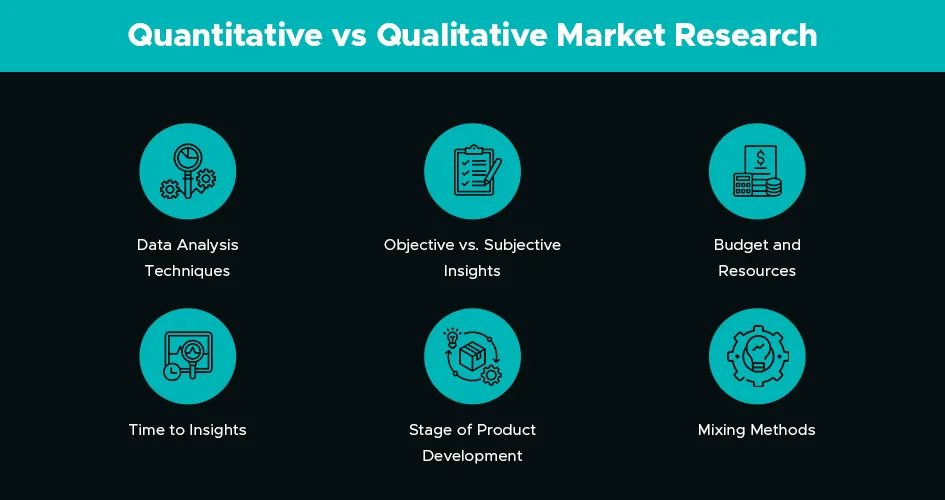
Market research is an important tool that helps businesses to make informed decisions whether they are going to launch a new product or want to boost the sales of their existing one. It helps them to understand their customers better, and identify opportunities for growth. But when it comes to choosing the right approach, it can be confusing – should you go with quantitative or qualitative methods? Each method offers distinct benefits and challenges, and choosing the right approach can significantly impact your strategy and results. In this guide, we will break down the strengths and limitations of each method, helping you determine the optimal approach for your business needs.
What is Quantitative Market Research?
Quantitative market research focuses on quantifying problems and outcomes through numerical data. It involves large-scale surveys, polls, and questionnaires designed to collect measurable, statistical information about specific issues. This method is perfect for testing methods, evaluating market trends, and making general predictions based on hard data.
Pros of Quantitative Market Research
- Scalability: Easily collect data from a large sample size, making the results statistically significant and broadly applicable.
- Objectivity: Minimizes researcher bias by using structured methods and relying on numerical data.
- Precision: Offers clear, concise data points that are easy to analyze and interpret.
Cons of Quantitative Market Research
- Lacks Depth: While it provides a wider perspective, it often misses the complexity that qualitative data can reveal about consumer behavior.
- Inflexibility: Once a survey or study is launched, it is difficult to make changes based on responses or new directions in research.
- Superficiality: May not capture the reasons behind consumer behaviors or the emotions that drive decision-making.
What is Qualitative Market Research?
Qualitative market research is investigative and aims to understand the underlying reasons, opinions, and motivations behind consumer behavior. It uses open-ended questions and discussions through focus groups, in-depth interviews, and observation methods. This approach is best for understanding complex issues, revealing the context behind user decisions, and generating ideas for innovation.
Pros of Qualitative Market Research:
- Depth of Understanding: Provides a deeper insight into customer attitudes, feelings, and behaviors.
- Flexibility: Researchers can adapt their methods and questions in real time to follow interesting developments during data collection.
- Rich Data: Generates detailed narratives and stories that help businesses understand the subtleties of consumer preferences.
Cons of Qualitative Market Research:
- Subjectivity: The presence of researcher bias can influence the interpretation of results.
- Smaller Scale: Typically involves smaller samples, which may not be representative of the broader population.
- Time-Consuming: Collecting and analyzing qualitative data can require more effort and resources due to its complex nature.
Quantitative vs Qualitative Market Research
Choosing between quantitative and qualitative market research methods depends on the specific needs of your business and the nature of the information you seek. Here are some pointers to guide what to choose from quantitative vs qualitative market research:
Data Analysis Techniques: Quantitative research often involves statistical analysis, which can provide clear, actionable metrics and identify trends. Qualitative research, on the other hand, involves thematic analysis where patterns and concepts are identified within the data. This can provide richer detail but may require more specialized skills to interpret effectively.
Objective vs. Subjective Insights: If you need to quantify data and obtain results that are generalizable to a larger population, quantitative methods are preferable. If you are looking to explore ideas or uncover deeper insights into customer motivations, qualitative methods are better suited.
Budget and Resources: Quantitative research can be more cost-effective at scale but requires a robust initial design. Qualitative research is generally more resource-intensive, needing skilled researchers to conduct and analyze.
Time to Insights: Quantitative methods can often lead to quicker conclusions because the data is structured and can be swiftly analyzed using software. Qualitative data takes longer to process and analyze because it involves detailed observations and interpretations of complex interactions and sentiments.
Stage of Product Development: In early stages, when you are defining problems or ideating solutions, qualitative research is invaluable. For validating hypotheses and measuring market readiness, quantitative research is more effective.
Mixing Methods: Often, the best approach is a mixed-methods strategy, which uses the strengths of both quantitative and qualitative research to provide a comprehensive view of the market.
Choose Insights Opinion for Advanced Market Research Services
Insights Opinion is a quantitative and qualitative market research agency that understands that the right market research strategy can make the difference between success and failure. Our expertise in both qualitative and quantitative market research techniques ensures that we can offer a tailored approach that meets your specific business challenges and objectives. Whether you need quantitative data analysis services to model consumer behavior or qualitative insights to drive product innovation, Insights Opinion provides best market research services that deliver actionable insights.
Frequently Asked Questions
Quantitative research focuses on numbers and statistics to analyze trends, while qualitative research explores deeper insights into people's behaviors and motivations through discussions and observations.
Yes, combining both methods can provide a more comprehensive understanding of the market by leveraging the numerical depth of quantitative data and the contextual insights of qualitative analysis.
Consider your project’s goals: Use quantitative research for broad, generalizable results and qualitative for deeper, more detailed insights. Budget, time constraints, and the type of data needed also play critical roles in this decision.
Relying only on qualitative research may lead to decisions based on non-representative data, as it often involves smaller, less diverse samples and can include subjective biases.









